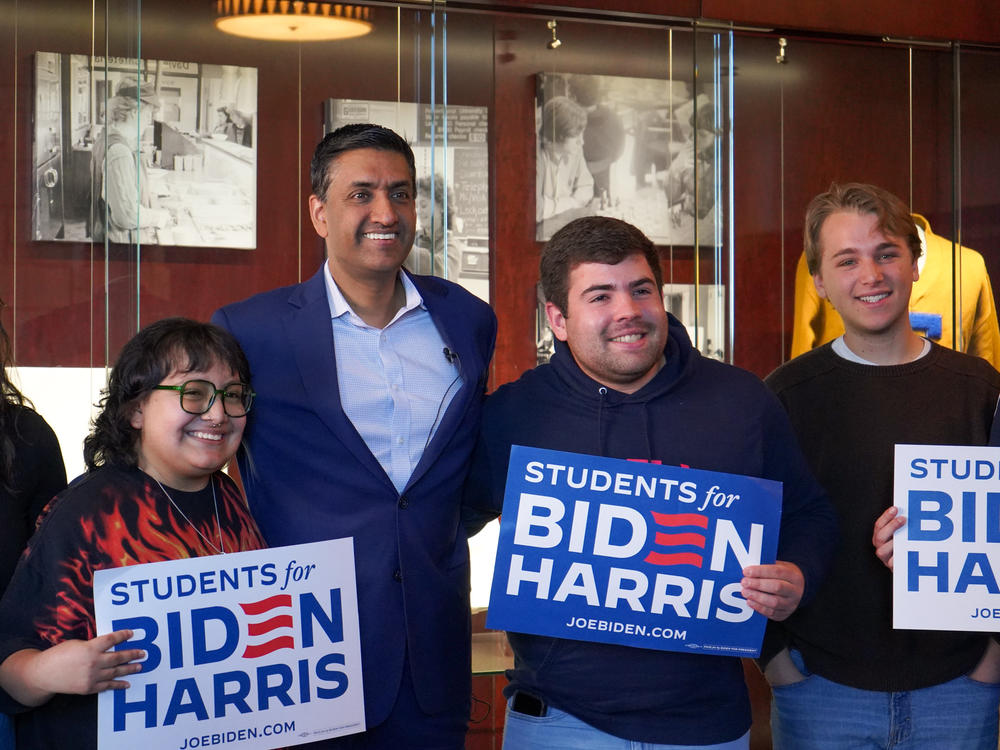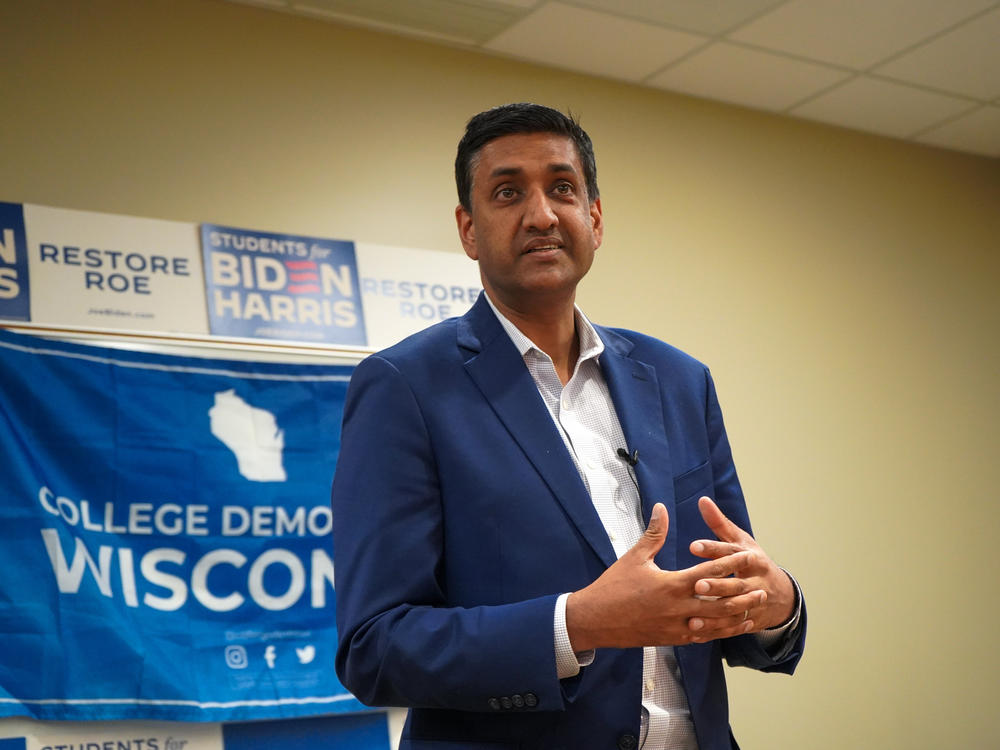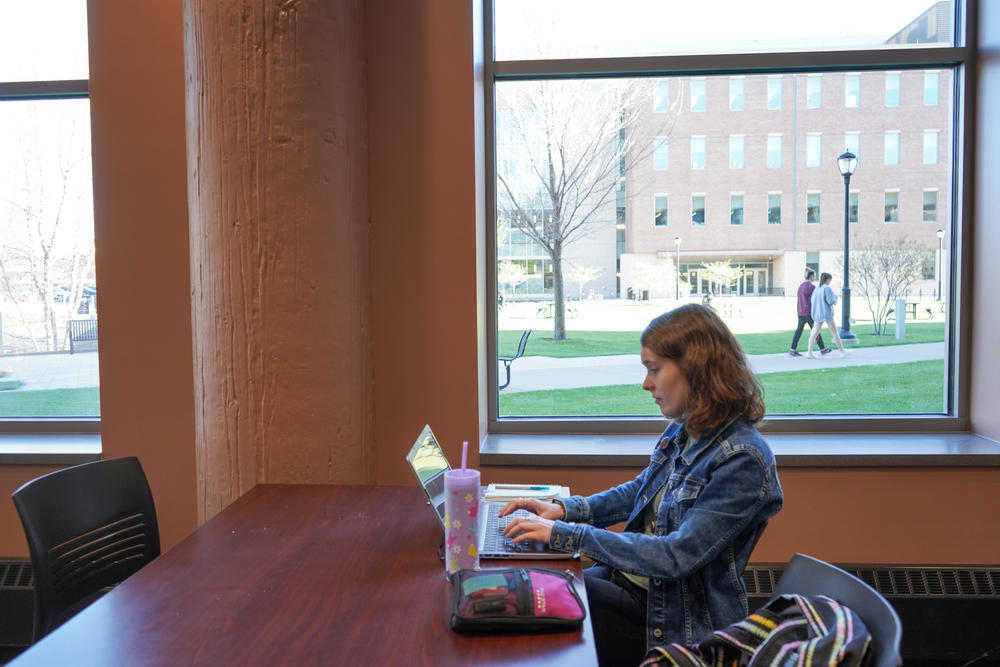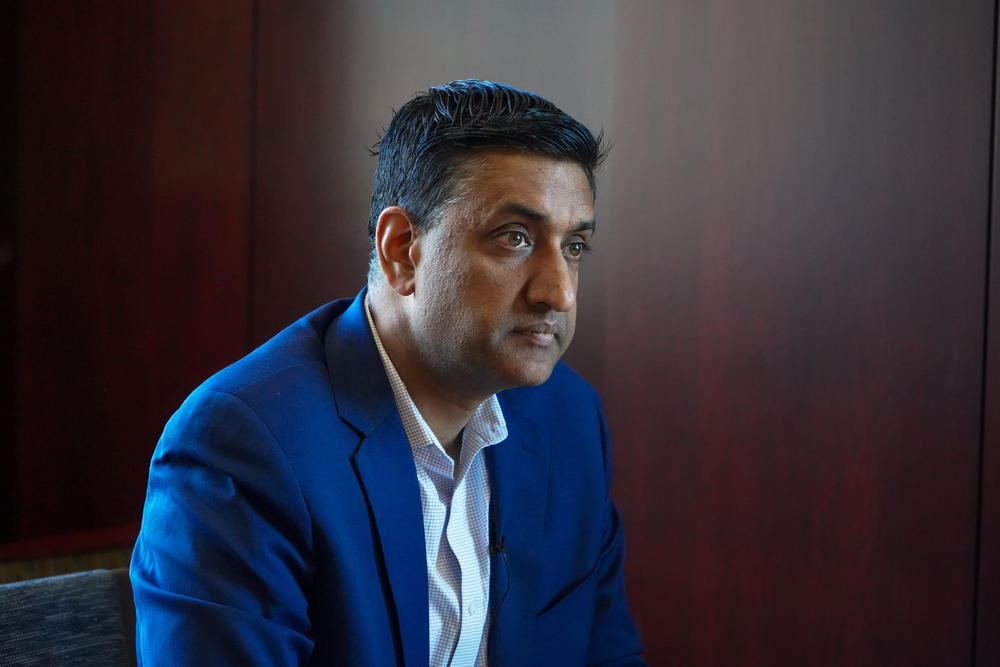Section Branding
Header Content
Six months out from the election, Wisconsin students weigh voting for Biden
Primary Content
It's a sunny morning at the University of Wisconsin-Eau Claire as around a dozen young organizers talk politics at the student union.
Rep. Ro Khanna, D-Calif., is leading the discussion from the head of a conference room table laid out with Biden campaign information, buttons and posters that read "Students for Biden Harris."
"You all will really decide this election in this state," Khanna said. "So let me ask, what is your advice on what all of us should be talking about? Issues that you think appeal to young people here on this campus?"
It was the first in a series of five listening sessions Khanna held with students from different universities across Wisconsin, focused on reelecting President Biden.
The tour was coordinated by the Biden campaign and marked another concerted effort to appeal directly to young voters, a group they're heavily investing in nationwide. In Wisconsin, the campaign has been working with the state Democratic party to organize across college campuses and online.
But the president has continued to struggle with low approval among voters under 45, particularly Gen Z and younger millennials — the same age groups that decidedly voted for him four years ago. In Wisconsin, where Biden defeated former President Donald Trump by just under 21,000 votes last time, Democrats are banking on student support again.
According to discussions NPR was present in and additional conversations relayed by Khanna's staff, students at the five sessions stressed issues including protecting abortion access, their financial future and addressing climate change. But they also expressed concern about rallying their classmates to back Biden.
NPR went on to speak with nearly 30 students outside of the events, and many expressed dissatisfaction with their options. That puts students who lean blue and yet disapprove of Biden with a tough choice: Back Biden or sit it out — a move that could indirectly benefit Trump.
Conflicted Democratic voters
That dilemma, in part, comes as some young voters continue to question Biden's response to the Israel-Hamas war.
Biden has strongly supported Israel since the Hamas Oct. 7 attack that killed 1,200 people. But since then, as the death toll in Gaza has climbed, he has become more critical of Israel's military response and has pushed for a temporary cease-fire.
However, to many young voters who want a permanent cease-fire, Biden's actions are not enough. Even at a school like Eau Claire, far from the Universities of Wisconsin in Madison and Milwaukee where students are protesting in support of the Palestinian people, it was a topic of discussion.
"We just need to have a good answer," explained Matthew Lehner, the president of Wisconsin College Democrats and a student at Eau Claire. "A lot of young people are concerned. And, you know, I am concerned as well," said Lehner, who supports Biden.
Less than 100 miles away at the University of Wisconsin's campus in La Crosse, 23-year-old Danielle Hoffman is finishing up her final classes of her senior year. She's excited to graduate, but her enthusiasm subsides when she thinks about the election.
"I would like to hope one day that it's not going to feel like you begrudgingly have to vote for somebody," she said. "I would like to be like, 'I can actually really get behind this person.' And instead of feeling like, you know, 'I've got to check a box.'"
Hoffman was not part of Khanna's session at her school. She doesn't support Trump, and as someone passionate about protecting abortion rights and the climate, she is leaning towards Biden. But the ongoing conflict in Gaza is holding her back.
On top of large-scale campus demonstrations nationwide, youth-led movements pushing for Biden to call for a permanent cease-fire and stop additional aid to Israel have occurred through protest votes during the presidential primaries. In Wisconsin, over 48,000 people voted "uninstructed" in the April Democratic primary. Hoffman was one of them.
"Clearly, that's an issue, and that's important to a lot of people," Hoffman added. "I hope he listens."
Khanna's pro-Biden balance
After his meeting with La Crosse student leaders, the California progressive Democrat told NPR that the Biden campaign recognizes the violence in Gaza is an issue young people care about.
"Not just the Arab American community, not just the Muslim American community, not just progressives, but young people in many parts of America," he said.
"The challenge is, it's not a messaging issue. It is an issue of getting the war to end, shifting policy — but it's also an issue of showing up. We've got to be willing to come to college campuses and listen to young people and have those difficult conversations on Gaza and not shy away from it," he added.
Khanna is a unique messenger on the campaign trail. He endorsed the president's reelection bid but also pushed him to go further in criticizing Israel, voting against the congressional aid package that included funding for the country and calling for a permanent stop to the war. He's also held unaffiliated events at universities around the country, including in Wisconsin, where he's addressed the conflict with students.
On this trip with the Biden campaign, Khanna went on to hold discussions at the Universities of Wisconsin in Green Bay and Stevens Point — where his office says the war was also mentioned. It did not come up during his discussion at La Crosse, but student organizers told NPR afterward that it was a concern for them as well.
In addition to economic and social issues, Khanna sees Biden's handling of the conflict as another issue that could influence campaign support — one way or another — moving forward.
"It would be foolish to think that this wouldn't make a difference, especially when we're talking about an election that is on the margins," Khanna said.
But will this cost Biden votes?
It remains unclear how much electoral support the president may lose this fall over his handling of the conflict in the Middle East.
Though Biden's approval among young voters is low, especially on the issue, just 38% of Americans under 30 say they're following developments on the war, according to the latest Harvard Youth Poll. Biden also leads against Trump among young voters in Wisconsin, with over two-thirds of registered voters under 30, according to a recent survey from CBS News.
Notably, abortion access has been a significant motivating issue for young voters in recent elections in Wisconsin. Last spring, the state saw high levels of turnout in college precincts for an off-year state Supreme Court race to Janet Protasiewicz, who campaigned heavily on safeguarding abortion access.
In the 2022 midterms, the first election after the overturning of Roe v. Wade, Wisconsin recorded the highest youth turnout in the country, according to the U.S. Census Bureau.
The Biden campaign has been stressing abortion as a key issue when appealing to young voters — but many students can't look at one issue in a vacuum.
As Khanna met with students and organizers nearby in downtown Milwaukee, Miles Medina was studying at the University of Wisconsin Milwaukee's student union.
Medina, who is 27 and transgender, said reproductive care, along with LGBTQ rights and climate justice, are top of mind.
"I'm female-bodied," Medina said, "When Roe v. Wade was overturned, I felt like that was — those are some of my rights that were taken away."
But Medina feels conflicted when thinking about the presidential race. Trump is not an option, and they acknowledge the steps Biden has taken to increase transgender rights, but they — like other students in the state — are upset by how Biden has approached the Israel-Hamas war.
"I know if I vote for Biden, I will be more comfortable as an American here in America," they said. But Medina questions whether they can stomach voting for him because of the violence in Gaza.
"And I know that's something that a lot of people my age are like, 'What do we do?'"
Correction
An earlier version of this story said the Universities of Wisconsin Eau Claire and La Crosse were a couple hundred miles apart. The campuses are less than 100 miles apart.





